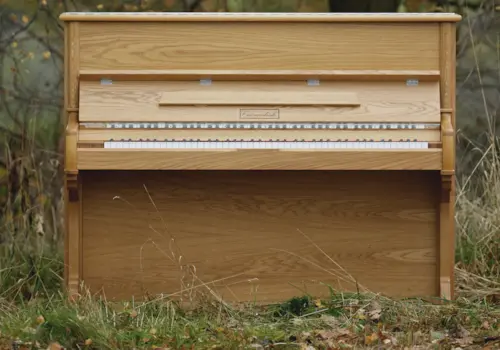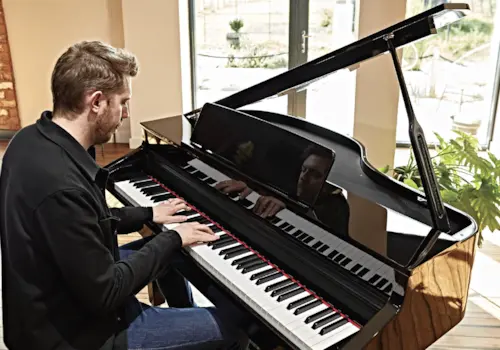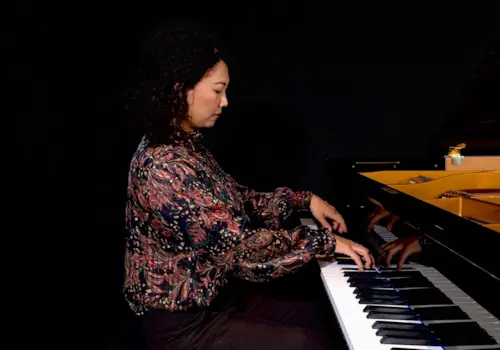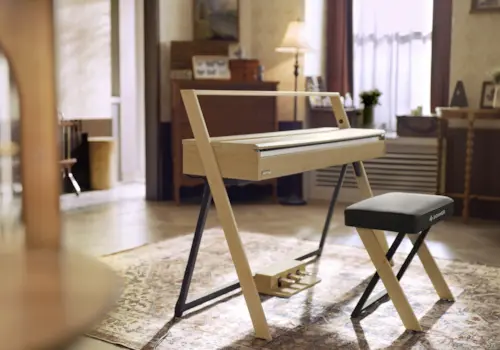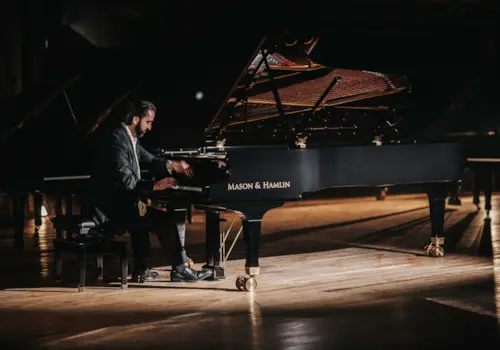17 July 2018
|
Pianist masterclass contributor Mark Tanner gives us an insight into his latest release, 'Mindfulness in Music'.
by Mark Tanner
My latest book, Mindfulness in Music, forms part of an ongoing series of exquisitely presented hardback books from Leaping Hare Press. More than just a convenient ‘peg’ onto which we might hang such topics, mindfulness seeps meaningfully into some of the light-starved corners of our lives.
Importantly, mindfulness doesn’t have to be something ‘other’ people do, indeed I try my best to avoid overly spiritual or religious references. Being mindful, after all, is in common parlance simply another word for being purposeful, and I find this a much more accessible ‘in’ to the notion of mindfulness than, say, Buddhism – one could even think of piano playing as a practical meditation, just as some people find kneading bread a way of becoming enjoyably lost in themselves. In essence, we’re talking about savouring the here-and-now (rather than forever looking ahead to what’s on the horizon), avoiding judgement in favour of awareness, and simply noticing what our senses pick up as we move around.
Implicit in all this is being more compassionate with ourselves (as well as the world of which we are merely custodians) and being more alive to the possibilities life passes to us as we scamper about in pursuit of success, money or the fulfilment of ambitions. This is not to decry a desire for better things in our lives of course, or to reject the notion of critical thinking; indeed, without these things, musicians would quickly lose the drive to improve their skills. The challenge is one of keeping our musical motivations in perspective so that we don’t over-reach or become slaves to our longer-term desires.
“Mindfulness in Music is both informative and thought-provoking – a fascinating read on many levels” - Julian Lloyd Webber
In more specifically pianistic terms, I’ve always felt that we are at our most contented and stimulated when we make the right choices about what we play and how well we ultimately hope to play it. The problem with structured learning and teaching (or indeed the flip side of these things, examining, which is an activity that soaks up several months of my year) is that we easily slip into an unthinking, automaton mode. As we dart feverishly from one level, or grade, to the next without pausing to reflect or breathe, we feel less inclined to take time out to indulge in those kinds of activities we might for convenience label as ‘fun’ or ‘entertainment’. I’m thinking of things like playing duets, accompanying friends or family who sing or play another instrument, improvising or learning/revising/sight-reading through music that we might otherwise dismiss as too ‘easy’.
Actually, I see no reason to think that satisfaction for pianists only comes from lofty ‘end-gaming’ activities such as mastering Bach fugues. The pursuit of progress quickly tips into the neglect of equally important things if we allow ourselves to be deluged by a tidal-wave of self-improvement and box-ticking. It’s for each of us to gauge what will be good for us in the long run, but also to weigh up what might bring a smile to our face right now. And if this means putting Bach to one side occasionally and reaching for Joplin or Jamie Cullum, so be it. There’s got to be more to learning the piano than ensuring we get what’s ‘good’ for us; we can surely allow ourselves the odd doughnut in amongst all that high-roughage bread.
“Mark Tanner has written a mindfulness manifesto for music” - Tom Service, BBC Radio 3 ‘Music Matters’
Mindfulness in Music is very much concerned with these types of challenges and distractions. Has there ever been a time since the Age of Enlightenment in which we feel more under siege – even from the things that are supposed to relax or entertain us? The book is a coming together of my musings on music – what music ‘is’, why it matters to us so much, and at the same time how we might reconsider some of the givens in our lives that threaten to undermine us. We’ve simply not enough time to listen to all that music, read all those books or watch all those movies. Some of us feel guilty if a day off isn’t in some way productive or edifying, and I’ve known many serious pianists who seem reluctant to indulge in a spot of something lighter, even for five minutes in a full day of practising.
“Invigorating and thought provoking” - Martino Tirimo
My book of 2016, The Mindful Pianist (published by Faber), grappled with what I consider to be the nitty-gritty of piano playing. But even before we’ve got started on ways of doing and thinking about these things productively, we’d need to look at how to focus our attention more keenly. We’ll soon become more productive in our practising – and perhaps even performing. We can then look at how we might better engage or collaborate with others as we make beautiful music sat at our beloved instrument. I now realise that many of the ideas that found their way into Mindfulness in Music were hatched when writing The Mindful Pianist, and I like to think that these more thoughtful approaches to learning, teaching and enjoying music all resonate easily with our everyday lives. In this latest publication, I’m consciously more concerned with the experiential and sensual side of music, rather than how to play – what to listen for, for example, or how music affects us in a multitude of ways us and sometimes rekindles memories. These are all creative pursuits, at their core, for without attentive listeners, music, or indeed the sound of nature, may as well not exist.
If you’re interested in finding out more about the thirty or so other mindfulness books in the Leaping Hare Press series, you might like to visit the website www.quartoexplores.com where you’ll find books ranging from beekeeping to surfing (and just about everything in between).


